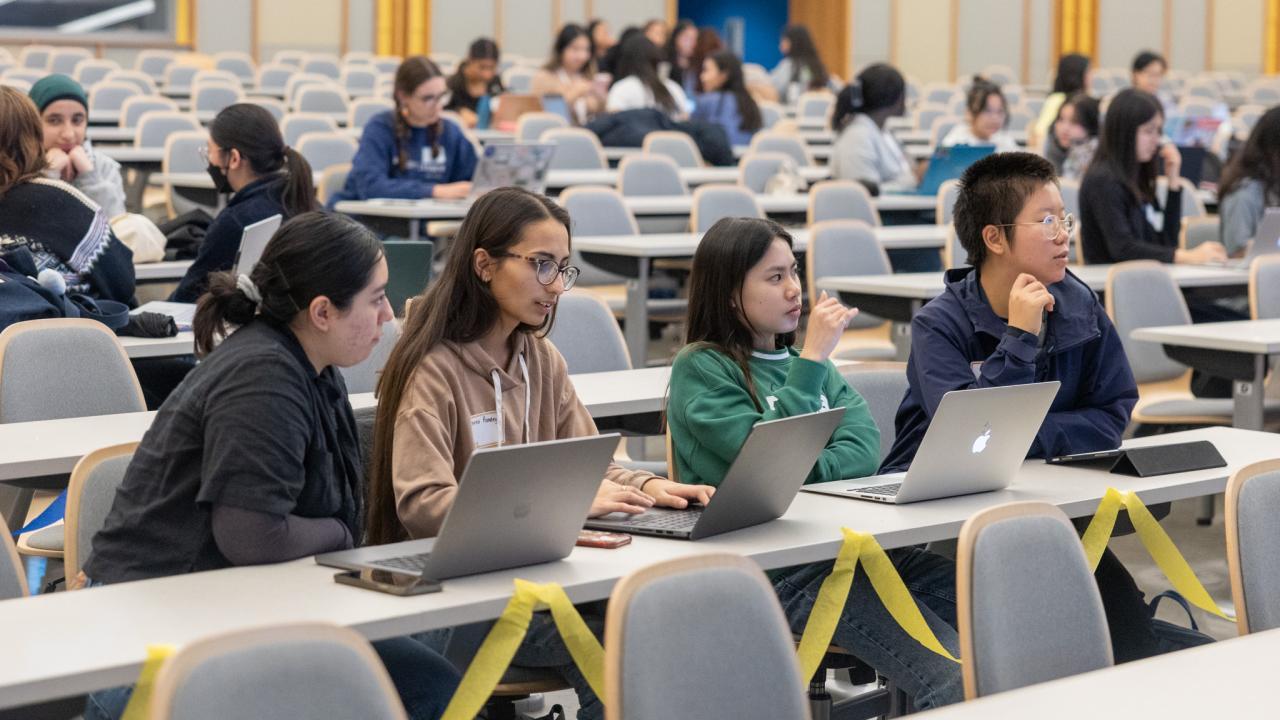
On a Friday evening, around 100 UC Davis students gathered in California Hall for a university hackathon event. Groups dappled the rows of the campus’s largest lecture hall, huddled together as they discussed ideas and tapped away on their laptops. They were challenged to design a product addressing one of the event’s three themes: social impact, sustainability or student life.
But unlike other hackathons in the tech space, Her Hacks, an event organized by UC Davis Girls Who Code, was exclusive to women and non-binary individuals, providing a welcoming environment for a group that’s consistently outnumbered in the tech space. According to The World Bank, women make up less than one-third of the world’s workforce in technology-related fields. UC Davis Girls Who Code aims to change that.
“This is our second year in existence,” said Nishi Bhagat, the club’s founder/president and a junior at UC Davis. “Girls Who Code is really open to all experience levels, backgrounds and majors. It’s a great way for people who are interested in the tech industry to come try things out in a low-stakes environment where they’re able to really pursue their goals. Something that we really emphasize is that you don’t need any coding experience or technical experience to join.”
Bhagat and her colleagues designed Her Hacks as an entryway to hackathon-style events. While such events usually occur over a 24- to 48-hour period, Her Hacks was three hours long and tailored to all experience levels. Students could design their project/product using code, Google Slides or the design program Figma, among other tools. A panel of judges — which consisted of faculty, graduate students and senior undergraduate tech club leaders — evaluated the final projects.
“This is a great opportunity to put all of the ideas that you have in your head into practice,” said Priyal Soni, a Her Hacks judge and graduate student studying computer science. “Even if you don’t know much, I feel like this is a great platform to connect with your peers and maybe get into the field if you want to.”
Outside of the Her Hacks event, the UC Davis Girls Who Code chapter is regularly active on campus. They hold workshops, host speakers from the tech space and conduct study sessions for group members. Part of Bhagat’s goal is to share the versatility and innovative nature of coding with other women and non-binary individuals across campus.
Students Saisha Hongal, Jamie Fong and Nataly Barreto won the event with their app concept Bike Buddy. The app aims to promote biking on campus through a reward system in which bikers earn points for a virtual pet once they reach a biking goal.
Bhagat and the other event organizers were pleased with the turnout and success.

“People came up to us and expressed how much they enjoyed it and appreciated having this type of space on campus, and we do plan to continue having similar events,” she said. “We plan to continue with our regular weekly meetings that range in content along with hosting various workshops where people can develop their skills and continue to grow within our community.”
UC Davis Girls Who Code will soon host a Pancakes and Personal Websites Workshop where members can enjoy brunch while designing personal websites. Learn more about UC Davis Girls Who Code by following them on Instagram or by emailing the team directly.
Photos by Greg Watry/UC Davis.
